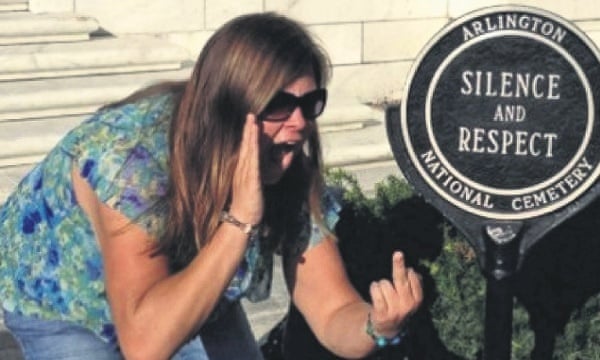In October 2012 a group of adults with learning difficulties took an organised trip to Washington DC. They visited the National Mall, the US Holocaust Memorial Museum, the Smithsonian, Arlington National Cemetery, the US Mint. At night they sang karaoke in the hotel bar. Their caregivers, Lindsey Stone and her friend Jamie, did a duet of Total Eclipse Of The Heart. “They had the greatest time on that trip,” Lindsey told me. “They thought we were fun and cool.”
Lindsey was telling me the story 18 months later. We were sitting at her kitchen table, in a seaside town on the US east coast. “I like to dance and I like to do karaoke,” Lindsey said, “but for a long time after that trip, I didn’t leave the house. During the day I’d just sit here. I didn’t want to be seen by anybody.”
“How long did that last?” I asked.
“Almost a year.”
Lindsey and Jamie had been with Life (Living Independently Forever) for a year and a half before that trip. Life was a residence for “pretty high-functioning people with learning difficulties”, Lindsey said. “Jamie had started a jewellery club, which was a hit with the girls. We’d take them to the movies. We’d take them bowling. We heard a lot from parents that we were the best thing that ever happened to that campus.”
Off-duty, she and Jamie had a running joke: taking stupid photographs, “smoking in front of a no-smoking sign or posing in front of statues, mimicking the pose. We took dumb pictures all the time. And so at Arlington [the national cemetery] we saw the Silence And Respect sign… and inspiration struck.”
Lindsey posed in front of it, pretending she was shouting and swearing – flipping the bird, and with her hand to her open mouth. “So,” Lindsey said, “thinking we were funny, Jamie posted it on Facebook and tagged me on it with my consent, because I thought it was hilarious.”

Nothing much happened after that. A few Facebook friends posted unenthusiastic comments. “One had served in the military and he wrote a message saying, ‘This is kind of offensive. I know you girls, but it’s tasteless.’ Another said, ‘I agree’, and another said, ‘I agree’. Then I said, ‘Whoa! It’s just us being douchebags! Forget about it!’”
After that, Jamie said to Lindsey, “Do you think we should take it down?”
“No!” Lindsey replied, “What’s the big deal? No one’s ever going to think of it again.”
Their Facebook settings were a mystery to them. Most of the privacy boxes were ticked. Some weren’t. Sometimes they’d half-notice that boxes they’d thought they’d ticked weren’t ticked.
Lindsey has been thinking about that “a lot” these past 18 months. “Facebook works best when everyone is sharing and liking. It brings their ad revenues up.”
Was there some Facebook shenanigan where things just “happen” to untick themselves? Some loophole? “I don’t want to sound like a conspiracy theorist. I don’t know if Jamie’s mobile uploads had ever been private.”
Whatever: Jamie’s mobile uploads weren’t private. And four weeks after returning from Washington DC, they were in a restaurant, celebrating their birthdays – “We’re a week apart” – when they became aware that their phones were vibrating repeatedly. So they went online.
“Lindsey Stone hates the military and hates soldiers who have died in foreign wars”, “You should rot in hell”, “Just pure Evil”, “Spoke with an employee from Life who has told me there are veterans on the board and that she will be fired. Awaiting info on her accomplice”, “After they fire her, maybe she needs to sign up as a client. Woman needs help”, “Send the dumb feminist to prison”. There were death and rape threats.
“I wanted to scream: ‘It was just about a sign,’” Lindsey said.
By the time she went to bed that night, at 4am, a Fire Lindsey Stone Facebook page had been created. It attracted 12,000 likes. Lindsey read every comment. “I really became obsessed with reading everything about myself.”
The next day, camera crews had gathered outside her front door. Her father tried talking to them. He had a cigarette in his hand. The family dog had followed him out. As he tried to explain that Lindsey wasn’t a terrible person, he noticed the cameras move from his face down to the cigarette and the dog, as if they were a family of hillbillies.
Life was inundated with emails demanding their jobs, so Lindsey was called into work. But she wasn’t allowed inside the building. Her boss met her in the car park and told her to hand over her keys. “Literally overnight, everything I knew and loved was gone,” Lindsey said. And that’s when she fell into a depression, became an insomniac, and barely left home for a year.
That year, Lindsey scanned Craigslist for carer work, but nobody replied to her applications. She was eventually offered a job caring for children with autism. “But I’m terrified,” she said.
“That your bosses will find out?’

“Yeah.”
This was a likely scenario. The photograph was everywhere. It had become so iconic among swaths of rightwingers that one man had even turned it into patriotic wallpaper, superimposing on to the wall behind Lindsey’s shrieking face and upturned finger a picture of a military funeral, complete with a coffin draped in the American flag. Lindsey had wanted the job so much she’d been “nervous about even applying. I was conflicted on whether to say to them, ‘Just so you know, I am this Lindsey Stone.’ Because I knew it was just a mouse click away.” She left it until the moment of the interview. And then the interview was over and she found that she hadn’t mentioned it.
Now she’d been in the job four months, and she still hadn’t told them. “And obviously, you can’t ask them, ‘Have you noticed it and decided it’s not a problem?’” I said.
“Right,” Lindsey said.
“So you feel trapped in a paranoid silence?” I said.
“I love this job so much,” Lindsey said. “I love these kids. One of the parents paid me a really high compliment the other day. I’ve only been working with her son for a month and she was like, ‘The moment I met you, seeing the way you are with my son, and the way you treat people, you were meant to work in this field.’ But what if she found out? Would she feel the same way?”
Lindsey could never just be happy and relaxed. The terror was always there. “It really impacts the way you view the world. Since it happened, I haven’t tried to date anybody. How much do you let a new person into your life? Do they already know?”
No comments:
Post a Comment